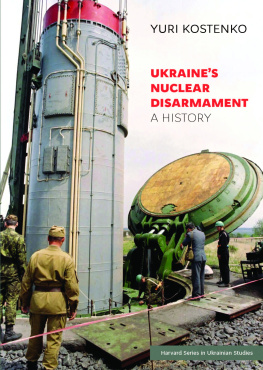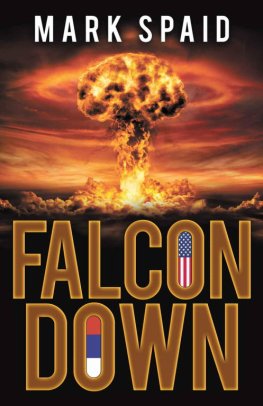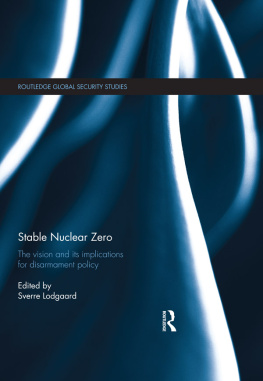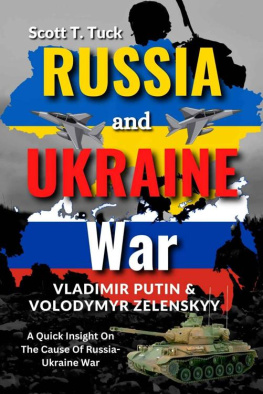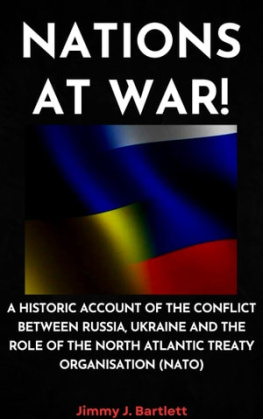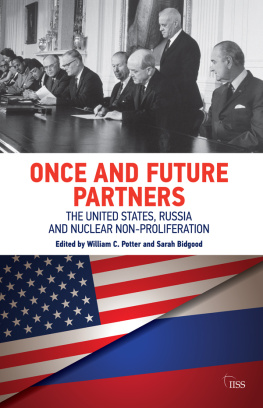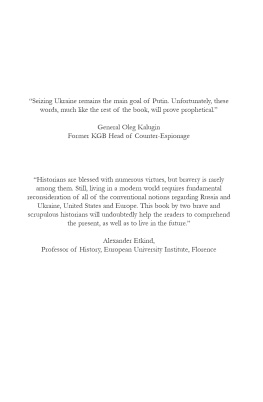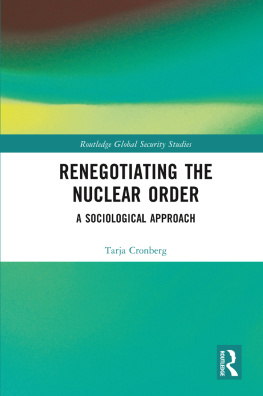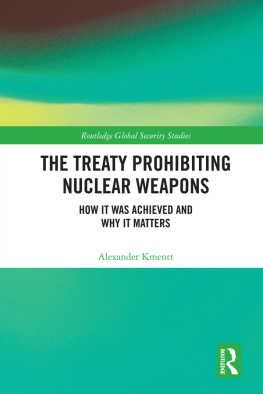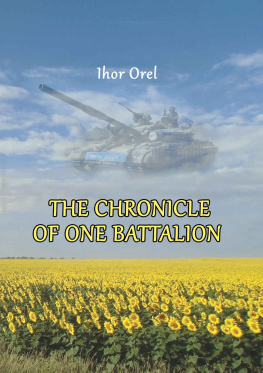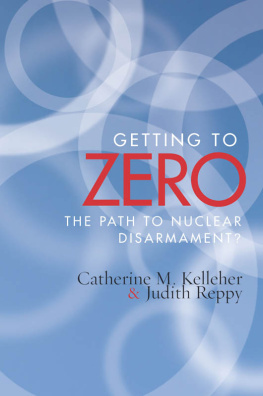Ukraines Nuclear Disarmament
A History
Ukrainian Research Institute
Harvard University
Harvard Series in Ukrainian Studies 78
HURI Editorial Board
Michael S. Flier
George G. Grabowicz
Serhii Plokhy, Chairman
Oleh Kotsyuba, Manager of Publications
Cambridge, Massachusetts
Yuri Kostenko
Ukraines Nuclear Disarmament
A History
Edited by
Svitlana Krasynska
Introduction by
Paul J. DAnieri
Translated by
Lidia Wolanskyj, Svitlana Krasynska, and Olena Jennings
Distributed by Harvard University Press
for the Ukrainian Research Institute
Harvard University
The Harvard Ukrainian Research Institute was established in 1973 as an integral part of Harvard University. It supports research associates and visiting scholars who are engaged in projects concerned with all aspects of Ukrainian studies. The Institute also works in close cooperation with the Committee on Ukrainian Studies, which supervises and coordinates the teaching of Ukrainian history, language, and literature at Harvard University.
Publication of this book has been made possible in part by the Translate Ukraine Translation Grant Program of the Ukrainian Book Institute, by the generous support of Ukrainian studies at Harvard University by the Ostap and Ursula Balaban Ukrainian Fund at the Ukrainian Research Institute, and by generous contributions from Oleksandr Hromyko, Mykhailo Koval, and Bohdan Kozak.
2020 by the President and Fellows of Harvard College
All rights reserved
Printed in the U.S. on acid-free paper
ISBN 9780674249301 (hardcover), 9780674250864 (epub),
9780674250871 (Kindle), 9780674250888 (PDF)
Library of Congress Control Number: 2020938440
LC record available at https://lccn.loc.gov/2020938440
Front cover illustration: A Nuclear Missile Is Removed from a Silo, Reuters Pictures. Reproduced with permission.
Cover and book design by Mykola Leonovych, https://smalta.pro
Acknowledgments
The idea of translating Ukraines Nuclear Disarmament into English was born as early as the publication of the Ukrainian edition. Nuclear weapons have been an important global issue, and the Ukrainian language alone does not reach all interested audiences. Thus, I accepted with great enthusiasm the offer of the Ukrainian Research Institute at Harvard University (HURI) to translate and publish this book in English.
From the very beginning, I received tremendous support from George G. Grabowicz, the Dmytro Chyzhevskyj Professor of Ukrainian Literature at Harvard University. Serhii Plokhy, the Mykhailo S. Hrushevskyi Professor of Ukrainian History and director of HURI, engaged more than once with me in discussions of Ukrainian matters and was most encouraging of the publication of my book. For this support I am very grateful.
The Ukrainian edition conformed to the norms and standards of publication in Ukraine, but required great organizational work and re-editing to overcome discrepancies in approaches with Western practices and to give context to the English-language reader. Dr. Oleh Kotsyuba, HURIs manager of publications, solved these challenges brilliantly, for which I am particularly grateful. My deepest gratitude is also owed to the books scholarly editor, Dr. Svitlana Krasynska, who spent many an hour with me tracking down original citations, and substantially revising and condensing the manuscript in preparation for translation for a scholarly Western audience. I am also very grateful to Dr. Michelle R. Viise, HURIs monographs editor, for her extensive work on the book, as well as to copyeditor Michael Diem and to Orysia Hrudka, our assistant in Kyiv, who helped obtain permissions for illustrations and image files. They all made a tremendous contribution to making the English edition outstanding.
My special thanks go also to Paul J. DAnieri, professor of Political Science and Public Policy at the University of California Riverside, for agreeing to read and comment on the manuscript of the English translation, as well as to write the introduction to this book. I would also like to thank Thomas S. Blanton, executive director of the National Security Archive at George Washington University and Dr. Svetlana Savranskaya, the Archives director of Russia programs, who both gave their support to this production of an English-language edition of the book.
Finally, this book would not have come into being in either Ukrainian or English were it not for the dedication and hard work of the journalist Iryna Lukomska, who edited the original publication. She walked the long and thorny road of manuscript preparation with me, from the categorization of the colossal archive of Ukraines nuclear saga to writing the book itself, for which I offer my heartfelt thanks.
A Note on Transliteration
Personal names have been transliterated in accordance with the Library of Congress transliteration systems for Ukrainian and Russian. Well-known personal names such as Yeltsin, Yushchenko, Nazarbayev, and Yanukovych appear in spellings widely adopted in English-language texts.
Place-names appear in the Library of Congress transliteration (without primes) or in the form sanctioned by the countries in whose political borders they are found today. English-language forms of long standing are used for the most well-known cities, including Moscow (rather than Moskva), Warsaw (rather than Warszawa), and Vienna (rather than Wien). In a small number of cases, place-names identify historical events and treaties. In these cases, we retain the transliterated form for the geographic location (e. g., Chornobyl, Ukraine; Almaty, Kazakhstan) but use the English-language form by which the event is known (Chernobyl, the nuclear accident; the Alma-Ata Protocol).
Introduction
Paul J. DAnieri
In January 1994, Ukraine signed the Trilateral Statement with the US and Russia, agreeing to surrender its nuclear weapons in exchange for security guarantees. Twenty years later, in 2014, Russia annexed Crimea and supported an insurgency in eastern Ukraine. Yuri Kostenkos book is focused on the first event, but the second looms over the analysis. Some believe that Russia could not have behaved as it did in 2014 had Ukraine retained its nuclear weapons. Others believe that the security commitments Western states issued at that time should have led to more robust support for Ukraine after Russias invasion. These beliefs have brought what seemed like a footnote in the history of arms control back to the center of our attention. Kostenko believes things could have been different, and his book recounts the events of that time in order to make that case. This is a first-hand account, but it is also an indictment of Ukraines policy, along with that of the US and Russia and of many of the people who shaped it.
Ukraines Nuclear Disarmament is significant in several respects. First, it provides an inside look into the politics that shaped Ukraines policy on this crucial issue. It affords us a detailed look into Ukrainian politics in the earliest months of independence. Second, it provides a documentary history. Kostenko includes excerpts of debates and documents that have not previously been available in English. It is both a primary and a secondary source. Read as a mixture of memoir, history, and polemic, as it must be, it provides a great deal of insight, as well as a great deal to argue about.

